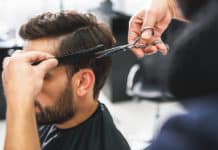I like the feeling of alcohol-based aftershaves. The feeling gives me a kick start and makes me feel like I’m alive. Luckily I have normal skin, so I don’t have to worry too much about what goes into my aftershave. However, I wrote this article for people who don’t like that burning sensation and don’t know what to do about it and how to get rid of it.
Aftershave can burn dues to its ingredients and chemicals, including alcohol, acetates, phthalates, and fragrances. Then depending on your skin type, aftershave can also burn even without harmful ingredients. Lastly, you need to be using a sharp razor to ensure your skin is not irritated from shaving.
In this article, we will go into depth about the ingredients and chemicals put in aftershave, the different skin types prone to burning, and finally, I will give you a step by step guide on how to apply aftershave and how to remedy the burn.
What could cause your aftershave to make your skin burn?
Two main factors can contribute to the fact that aftershave can cause your skin to burn, and these factors are mainly your skin type and the ingredients or chemicals that a manufacturer puts in their aftershave. The last thing that could be causing your aftershave to create a burning sensation is your razor.
We will have a look at these factors in detail so you will be able to tell which one of them or if both of these factors are contributing to the burning sensation you feel when you use aftershave.

What ingredients are in aftershave?
Alcohol
Aftershave can come in many different variations and can either contain or not contain alcohol. Primarily, alcohol is the main reason why your skin will burn once you apply aftershave to it.
I cover ingredients in aftershaves in my other article about why aftershaves are so expensive and if they are worth it to buy. Check that article out here.
Back to alcohol in aftershave. Alcohol is used as an astringent. This means that alcohol helps to cause the pores in your skin to close. We obviously want this effect because we don’t want our clean pores to get clogged with dirt after we have finished showering.
Alcohol is also great because we all know that it kills bacteria and germs and can be used to prevent infection. Hence, this is why so many aftershaves contain alcohol.
Those are the pros of alcohol for the skin. The downside to having an alcohol-based aftershave is that alcohol reduces moisture and makes it challenging for your skin to retain moisture. Hence, you can get skin that feels dry and rough.
To reduce or even completely remove that burning sensation, then I would suggest using an alcohol-free aftershave. Witch hazel is a common substitute which is better overall for the health of your skin.
Chemicals and other ingredients (acetates, fragrance, phthalates)
Phthalates
I don’t expect you to know all the ingredients and chemicals that make up your aftershave. Nobody does, and hence, manufacturers sometimes put just about anything into them, and for some instances, manufacturers do not even have to disclose what chemicals are in your aftershave.
Needless to say that besides alcohol, there are many chemicals that can cause your skin to burn. Some of these chemicals are even used in the industrial industry to soften plastic, and phthalates is one such chemical.
Side effects caused by phthalates can include hypospadias, reduced sperm count, and shrunken seminal vessels. Manufacturers are not even forced to say that they use these chemicals in their aftershave.
Phthalates are said to moisturize the skin so be careful because if your aftershave says that it can moisturize your skin then it may contain phthalates.
Acetates
Another harmful substance is acetates. Some acetates do come in the form of vitamin E and are used in many skin care products such as sunscreen. However, acetates are mild immunotoxic, and the side effects could be detrimental to your skin. These side effects could include burning, irritation, allergic reactions, and in some cases, acetates are linked with tumor growth.
The best thing to do is avoid aftershaves with acetates in them if you have sensitive skin, even if the aftershave is considered as a sunblock or it says it can moisturize your skin with vitamin E.
Fragrances
Some manufacturers put fragrance in their aftershave to give you a 2-in-1 kind of deal. Cologne is different to aftershave and may contain alcohol; however, cologne is not aftershave and is commonly mistaken for it.
For companies that put fragrance in their aftershave, their marketing strategy is to make you feel like you do not need to use cologne, and you can just use aftershave for both purposes.
Manufacturers and companies do not divulge what exactly they put in their fragrances, and your aftershave bottle will just have artificial fragrance or fragrance listed on it. The problem with this is that you do not know what ingredients, chemicals, or compounds they put in their fragrance, and thus they may be toxic or harmful to your skin, causing irritation and burning.
The best thing to do if you have sensitive skin is to use natural alternatives or colognes which are separate from aftershaves and which do not contain any alcohol.

What skin type do you have?
A very likely factor that your skin could be burning because of your aftershave is because of your skin type. Not all skin types will be subjected to skin burn, but it also depends on other factors.
The 5 skin types are normal, oily, dry, combination, and sensitive. The skin types of dry, combination, and sensitive will most likely be prone to severe burning or irritation when using an aftershave.
Normal and oily skin can be subjected to burning as well; however, this will be due to the ingredients of the aftershave and not the skin type itself per se.
Let’s look at the skin types that will be affected by your aftershave no matter what ingredients are used in your aftershave.
Dry skin
Dry skin is caused by the skin having less sebum than that of a normal skin type. Due to dry skin being cracked, flakey, or even broken, you could be subject to skin prone to irritation or allergic reactions because any form of chemicals or compounds can move through the skin more easily and thus can cause irritation or burning.
Combination skin type
A combination skin type has areas of the skin, which are dry, and then areas that are oily to a degree. The combination skin type can be locked to a region on the face called the T-zone. The T-zone is a portion on the face and can vary in size.
Again for dry areas of the T-zone, you have to be careful because dry and cracked skin can be more prone and subjected to chemicals and compounds that would not normally irritate or burn normal and oily skin types.
For dry and combination skin types, I would suggest that you stay away from aftershave, which is alcohol-based and contains any form of toxic chemicals.
Sensitive skin
If you have sensitive skin, then you have to be very careful what you put on it. Sensitive skin, skin diseases, and allergic reactions can come from many varying chemicals and compounds as well as from you inheriting them via genetics.
The best thing to do is use all-natural products on your skin and be sure you know what chemicals and compounds are being put in the skincare products you are using, such as your aftershave.
Blunt razors
You will be surprised, but the quality of your razor and how new or old it is could be directly related to your skin burning once you have applied aftershave to it.
If your aftershave is burning you and it is not supposed to then look at if you are using a blunt razor. This may be the cause of that. Blunt razors can cause skin irritation, skin rashes, and skin bumps. Then when aftershave is applied to your skin it may burn.
Step-by-step guide on how to apply aftershave and what to do if it burns
This little step-by-step guide will help you apply aftershave correctly and help prevent that burning sensation to a degree.
- Once you have finished shaving rinse off any extra facial cream or soap with warm water
- wash your face with cool or cold water. This will help the pores to close
- Tap your face and neck gently with a towel to dry off any excess water.
- Do not immediately apply your aftershave. give the skin and pores time to close, so brush your teeth or get dressed first.
- Apply a portion of your aftershave to your hands
- gently pat or rub in your aftershave depending on the type of aftershave you have.
The other thing to note is that alcohol aftershave will always give you a tingling sensation or burn feel. If you do not like that feeling, it is best to switch to a balm or gel aftershave with a cooling effect.
Conclusion
We now know that the main causes for your aftershave burning or creating that tingling sensation are the aftershaves ingredients, your skin type, and in some cases, your razor.
There are many different ingredients used in aftershaves and if you have sensitive skin and are prone to chemicals, then be sure to use all-natural alcohol-free aftershaves.
You also need to figure out what skin type you have because if you are using an all-natural aftershave and are experiencing burning, then look at what skin type you have and if you have any skin problems.
Lastly, always be sure to use a sharp razor because using an old razor can cause irritation, skin bumps, and rashes. You will definitely get a burning sensation from your aftershave if you have shaved and caused any skin irritation.



